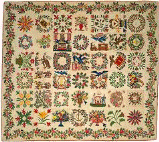Textile Society of America

Textile Society of America: Symposium Proceedings
Date of this Version
9-2012
Document Type
Article
Citation
Published in Textiles and Politics: Textile Society of America 13th Biennial Symposium Proceedings, Washington, DC, September 18- September 22, 2012.
Abstract
This proposal is for a joint presentation by professor and graduate student critically appraising the cultural politics of textile revitalization projects. We envision our presentational framework to be modeled on a conversation, which compares the implications of our different experiences as a folklorist doing fieldwork in Colorado's San Luis Valley and a weaver participating in a workshop located in the Bargath district of Orissa, India. One of our main interests, which is conditioned by the assumption that "all tradition is change," examines the political basis for such workshops that attempt to revive traditional crafts as economic redevelopment projects. Questions arise for us pertaining to the marketing of cultural identity and ethnic heritage via material culture (specifically weaving and embroidery), gender politics, aesthetic practices, class (or caste) dynamics as well as authenticity, conservatism, cultural transmission, and artistic choice. Above all, we query the very essence of craft revitalization movements in terms of individual creativity relative to an agenda of reviving or transforming a "waning" or moribund craft practice for socio-economic purposes. Our experiences initially converge when we discuss how ethnoaesthetic criteria operate in these workshop situations, and the relative degrees of local women's autonomy (socially, politically, and economically). We diverge when it comes to the successes and longevity of projects (e.g., why some externally funded textile revitalizations take hold and endure while others disappear), the subversive tactics or complicity of women artisans vis-‡-vis goals of external funding organizations, plus the aesthetic and economic viability of these textile craft revitalizations in light of political authority, social structure, and power.


Comments
Copyright 2012 by the author(s).